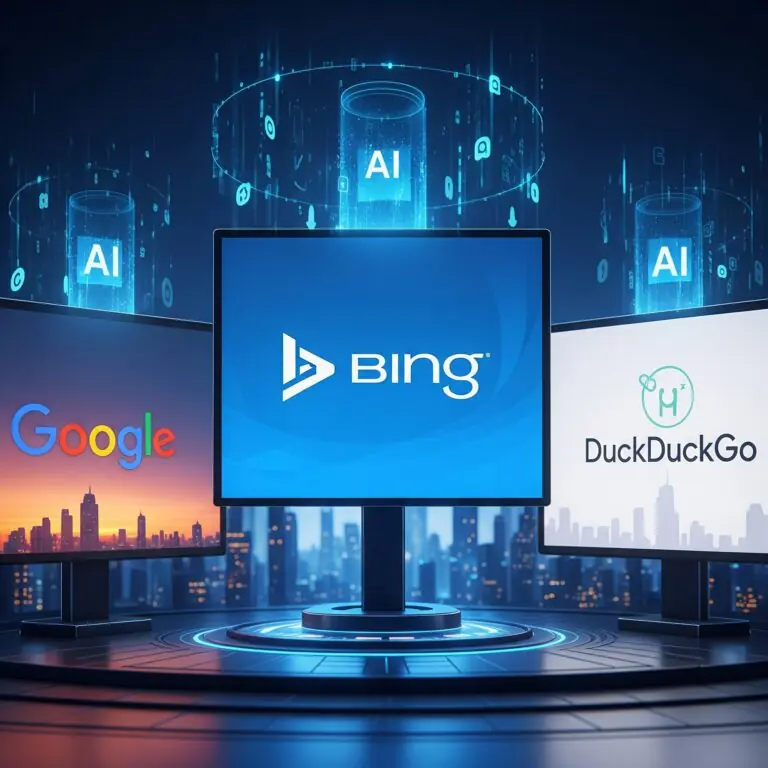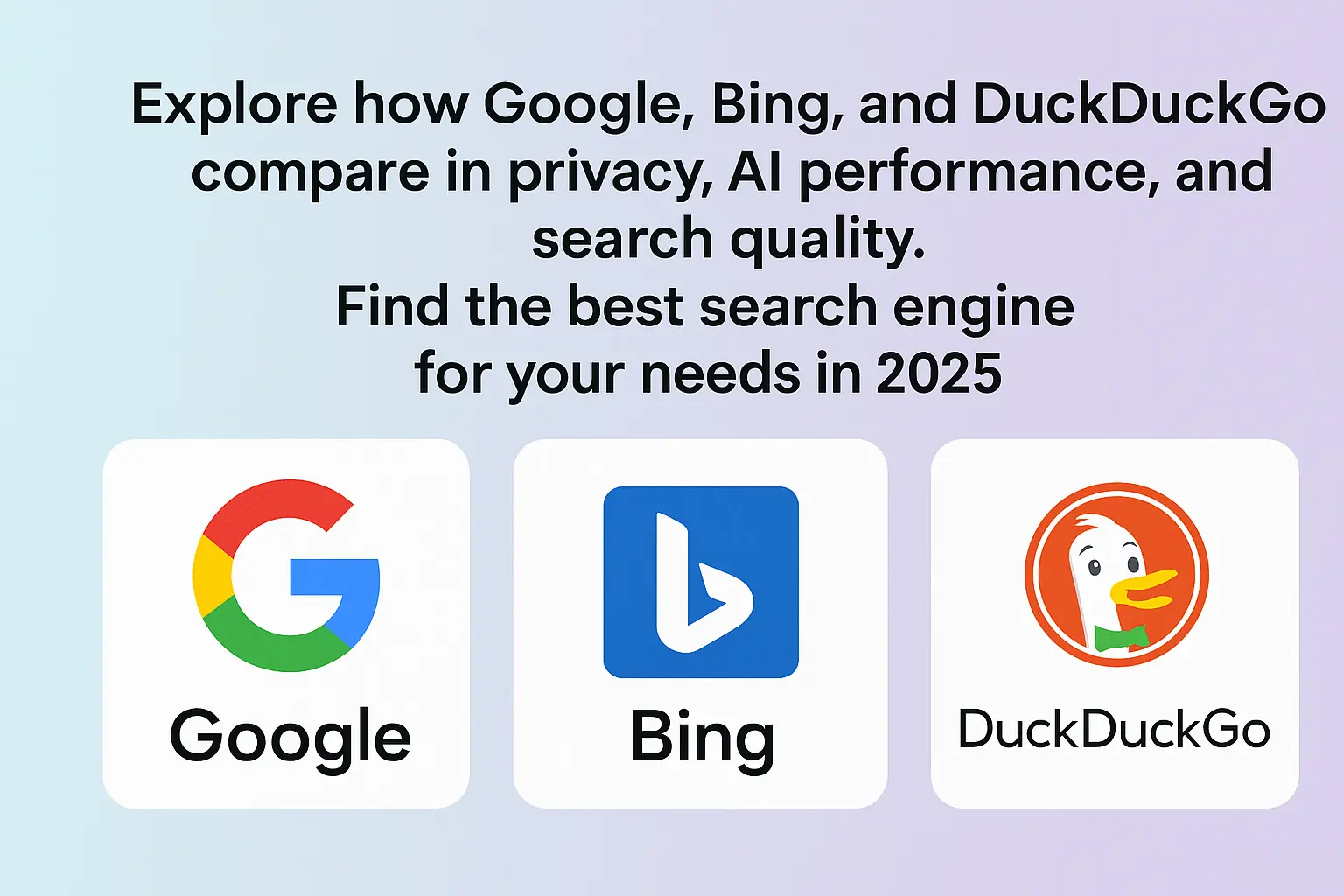Did you know that Google processes over 8.5 billion searches every day, commanding nearly 90% of the global search engine market? Yet, growing privacy concerns have pushed millions of users to explore alternatives like Bing and DuckDuckGo.
Which search engine truly balances privacy, power, and performance in 2025? As AI reshapes search and privacy becomes a top priority, understanding the strengths and trade-offs of Google, Bing, and DuckDuckGo is more important than ever.
Key Areas We Will Cover (What You’ll Learn)
- Overview of market share and user base in 2025, highlighting Google’s dominance and Bing’s growing presence
- Comparison of privacy policies and tracking practices across the three search engines
- Analysis of search result quality and AI integration, including recent advances like Microsoft’s AI-powered Bing and Google Gemini
- Unique features and user interface differences that impact usability and engagement
- Use cases: recommendations on which search engine fits different user priorities and needs
- Summary with actionable insights to help you choose the best search engine for your digital lifestyle
Introduction
In today’s digital age, choosing a search engine is more complex than ever. While Google remains the dominant force with nearly 90% market share worldwide, alternatives like Bing and DuckDuckGo have carved out niches by emphasising different priorities such as privacy, AI-powered features, and user experience. As search technology evolves rapidly in 2025, this article explores the privacy, power, and performance of Google, Bing, and DuckDuckGo to help you decide which search engine best fits your needs and values.

The Search Engine Landscape in 2025
Market Share and User Demographics
In 2025, Google continues to dominate the global search engine market, holding approximately 85–90% of worldwide market share, depending on the source and region. Statcounter reports Google’s share at around 84.7% globally as of May 2025, with Bing trailing at roughly 3.5% and DuckDuckGo at just under 1%. Other players like Yandex and Yahoo hold smaller shares, primarily in regional markets. (Reference)
In the UK, Google remains the top search engine, followed by Bing, which has gained traction partly due to its integration with Microsoft products and AI enhancements. DuckDuckGo, while still a niche player, appeals to privacy-conscious users and has seen steady growth in downloads and search volume globally.
Demographically, Google’s user base spans virtually all segments, from casual browsers to professionals, while Bing attracts a significant portion of users within the Microsoft ecosystem, including enterprise and older demographics. DuckDuckGo’s audience tends to skew towards privacy-aware users and those seeking an alternative to data-tracking-heavy platforms.
The Rise of AI in Search
Artificial intelligence has become a pivotal force reshaping search engines in 2025. Google has integrated its latest AI model, Gemini, enhancing contextual understanding and conversational search capabilities. Microsoft’s Bing, powered by ChatGPT technology, has introduced AI-driven features such as summarisation, content generation, and interactive search experiences that appeal to users seeking more than simple keyword matches.
DuckDuckGo, while more conservative in AI adoption, focuses on privacy-first AI tools and partnerships, including integration with the Tor network for anonymous browsing, maintaining its commitment to user confidentiality. The AI arms race between Google and Bing is intensifying, driving innovation and user expectations higher.

Privacy Showdown: Who Protects You Best?
Google’s Data Collection and Tracking Practices
Google’s business model is heavily reliant on advertising revenue, which depends on extensive data collection and user profiling. It tracks search queries, location, device information, and browsing habits across its ecosystem to personalise ads and improve services. While Google offers privacy controls and incognito modes, critics argue that its default settings favour data collection, raising concerns about user privacy.
Bing’s Approach to User Privacy
Microsoft’s Bing collects data to personalise search results and ads, but generally offers more transparent privacy controls than Google. Bing benefits from Microsoft’s broader commitment to privacy, including compliance with GDPR and other regulations. However, Bing still collects identifiable user data, and its integration with Microsoft accounts means some user information is shared across services.
DuckDuckGo’s Privacy-First Model and Tor Integration
DuckDuckGo stands out with its strict privacy-first approach. It does not track users, store personal information, or create user profiles. Searches are anonymised, and no cookies are used to follow users across the web. Additionally, DuckDuckGo offers a dedicated browser and integrates with the Tor network, allowing users to browse with enhanced anonymity and bypass censorship. This makes it the preferred choice for users prioritising privacy above all else.

Power and Performance: Search Result Quality
Google’s Comprehensive and Contextual Results
Google remains the gold standard for search result quality in 2025, thanks to its vast index and advanced AI model, Gemini. It excels at understanding complex queries and delivering highly relevant, context-aware answers. Google’s rich snippets, knowledge panels, and featured answers provide users with quick access to authoritative information. Whether you’re searching for detailed explanations, news, or scholarly articles, Google’s results tend to be comprehensive and well-organised, making it the preferred choice for power users and researchers.
Bing’s Visual and AI-Enhanced Search Features
Bing has made significant strides by integrating Microsoft’s Copilot AI, offering a visually immersive search experience. Its search results often include vibrant image and video grids, interactive maps, and easy-to-navigate filters, especially for local searches and travel planning. Bing’s AI summarisation and chat features help users get concise answers without sifting through multiple links. While Bing’s overall index is smaller than Google’s, its emphasis on visual content and AI-driven tools provides a unique and engaging alternative.
DuckDuckGo’s Simplified but Effective Search Experience
DuckDuckGo focuses on delivering straightforward, privacy-respecting search results without personalisation or tracking. While it lacks the extensive info panels and AI depth of Google or Bing, DuckDuckGo’s results are accurate and relevant for everyday queries. Its recent addition of AI features like Duck.ai Assist offers summarised answers and chatbot interactions without compromising user privacy. The interface is clean and uncluttered, appealing to users who prefer simplicity and privacy over exhaustive search features.
Unique Features and User Experience
Google’s Ecosystem Integration (Maps, Finance, Scholarly Articles)
Google’s search engine is deeply integrated with its broader ecosystem, offering seamless access to Google Maps, Google Finance, Google Scholar, and other specialised services. This integration enriches the user experience by providing hyper-localised results, real-time financial data, and academic resources directly within the search results. Google’s voice assistant and mobile apps further enhance accessibility and convenience, making it a powerful tool for users who rely on a connected digital environment.
Bing’s Visual Immersion and Travel Tools
Bing stands out with its visually rich homepage featuring daily background images and immersive search results. Its travel tools, including flight tracking and hotel booking, are integrated directly into the search interface, offering practical utility for travellers. Bing’s advanced image search and video previews provide a more engaging multimedia experience. The search engine’s filters and sorting options make it easier to find specific local businesses or services, appealing to users who value aesthetics and interactivity.
DuckDuckGo’s Tracker Blocking and Private Browser
DuckDuckGo prioritises privacy not only through its search engine but also with its dedicated browser that blocks trackers and enforces encryption. Its tracker blocker prevents third-party tracking scripts from following users across websites, enhancing online anonymity. The browser and search engine together create a cohesive privacy-first experience, including a Tor onion service for anonymous browsing. DuckDuckGo’s minimalist design and commitment to user confidentiality make it the top choice for privacy-conscious users.
Which Search Engine Should You Use?
For Privacy-Conscious Users
If protecting your personal data and online anonymity is your top priority, DuckDuckGo remains one of the best choices in 2025. It does not track your searches, store personal information, or create user profiles, ensuring your queries remain private. DuckDuckGo also offers a dedicated private browser and a Tor onion service for enhanced anonymity. Its simple interface and privacy-first AI features like DuckAssist provide useful answers without compromising confidentiality.
Other strong contenders for privacy-focused users include Brave Search, which operates independently with its own index and offers an ad-free premium option, and Startpage, which delivers Google’s powerful results without tracking by acting as a privacy shield. For those wanting maximum privacy and independence from major tech companies, Brave Search’s algorithmic independence is particularly appealing.
For Power Users and Researchers
For those who require the most comprehensive, contextual, and up-to-date search results, Google remains the leader. Its vast index, advanced AI model Gemini, and deep integration with specialised services like Google Scholar and Google Finance make it ideal for researchers, professionals, and power users who need detailed and authoritative information quickly.
Bing is also a strong contender here, especially with its AI-powered Copilot features that summarise information and provide interactive search experiences. Bing’s integration with Microsoft 365 and enterprise tools can be advantageous for business users and researchers who rely on Microsoft’s ecosystem.
For Visual and Interactive Search Lovers
If you prefer a visually rich and interactive search experience, Bing excels with its immersive image and video search, interactive maps, and travel tools. Its AI enhancements deliver concise summaries and chatbot-like interactions, making it a great choice for users who value multimedia content and practical tools embedded directly in search results.
Google also offers strong visual search features and ecosystem integration, but Bing’s focus on aesthetics and interactive elements gives it an edge for users who want a more engaging search environment.
Feature / Criterion | Bing | DuckDuckGo | |
Privacy Protection | 2.5 / 5 | 3.5 / 5 | 5 / 5 |
Search Result Quality | 5 / 5 | 4 / 5 | 3.5 / 5 |
AI Integration & Innovation | 5 / 5 | 4.5 / 5 | 3 / 5 |
User Experience & Interface | 4.5 / 5 | 4.5 / 5 | 3.5 / 5 |
Unique Features & Ecosystem | 5 / 5 | 4 / 5 | 3 / 5 |
Visual & Interactive Search | 4 / 5 | 5 / 5 | 2.5 / 5 |
Overall Score | 4.3 / 5 | 4 / 5 | 3.6 / 5 |
Notes:
- Privacy Protection: DuckDuckGo leads with its strict no-tracking policy; Google scores lowest due to extensive data collection.
- Search Result Quality: Google’s comprehensive index and AI give it the edge.
- AI Integration: Google and Bing both heavily invest in AI; DuckDuckGo is more cautious.
- User Experience: Google and Bing offer polished interfaces with rich features; DuckDuckGo prioritises simplicity.
- Unique Features: Google’s ecosystem (Maps, Scholar, Finance) is unmatched.
- Visual Search: Bing excels with immersive imagery and travel tools.
Conclusion
Choosing the right search engine in 2025 ultimately depends on what you value most: privacy, power, or an engaging user experience.
Google remains the undisputed leader in search result quality and AI innovation, making it the go-to choice for power users, researchers, and anyone who needs comprehensive, context-rich information quickly. Its deep integration with a wide ecosystem of tools further enhances its appeal.
Bing offers a compelling alternative with its visually immersive search features and advanced AI capabilities, appealing especially to users who enjoy interactive and multimedia-rich experiences. Its growing presence in the Microsoft ecosystem also makes it a strong contender for business and travel-related searches.
For those who prioritise privacy above all else, DuckDuckGo stands out with its strict no-tracking policies and privacy-first design. While it may not match Google or Bing in sheer power or features, it provides a clean, secure, and effective search experience that respects user anonymity.
Ready to Elevate Your Brand’s Digital Presence?
At Be My Social, we understand that every business deserves a marketing strategy tailored to its unique goals, not just generic templates. Whether you want to boost your SEO rankings, engage your audience with creative social media management, or launch powerful paid advertising campaigns, our expert team in Doncaster is here to help you grow your brand with real results and transparent, honest service.
Don’t let marketing take up your valuable time. Let us take it off your hands so you can focus on what you do best—running your business.
Get in touch today and discover how Be My Social can transform your online presence with strategies designed just for you.
Contact Be My Social Now and start your journey to real growth!
Frequently Asked Questions
Choosing the right search engine can raise many questions, especially when balancing privacy, performance, and features. Below, we answer some of the most common queries to help you make an informed decision.
Is Google less private than Bing and DuckDuckGo?
Yes, Google collects extensive user data to personalise ads and services, whereas Bing offers moderate privacy controls, and DuckDuckGo prioritises strict no-tracking policies to protect user anonymity.
Which search engine provides the most accurate and comprehensive results?
Google leads in delivering comprehensive, context-aware results thanks to its vast index and advanced AI. Bing also offers strong results with a focus on visual and interactive content, while DuckDuckGo provides reliable but simpler results without personalisation.
Can I use DuckDuckGo for professional research?
While DuckDuckGo is excellent for privacy, it lacks the specialised tools and deep indexing of Google, which is better suited for academic and professional research needs.
How do AI features differ between Google and Bing?
Google’s Gemini AI enhances contextual understanding and conversational search, while Bing integrates Microsoft’s Copilot AI for summarisation and interactive chat features. DuckDuckGo uses privacy-focused AI tools but is more conservative in AI adoption.
Are there any search engines better for travel and local searches?
Bing excels in travel-related tools and local searches with interactive maps and booking features, while Google also offers strong local search integration through Google Maps.
If you have more questions or want personalised advice on digital marketing and search strategies, feel free to reach out to us at Be My Social.

Peter
Peter Bezuidenhout is an SEO and digital marketing specialist based in KZN, South Africa, with a strong focus on serving UK and international clients. With nearly twenty years of experience, he helps brands increase their visibility and achieve growth through strategic SEO, results-driven campaigns, and creative content. His action-oriented, data-driven approach is tailored to help businesses thrive in today’s fast-paced digital world. Passionate about digital innovation, Pieter continues to deliver impactful results for his clients
A no-fuss attitude and a speedy turnaround!
I’ve found the to be the very best company for us after trying several others over the years.
I’m glad to have them, because the cost of hiring someone directly to do the same work would be impossible.
Highly recommended.
Ruth and Emily are amazing, they are always on hand to answer any questions and explain everything thoroughly.
Our contact Ruth always makes herself available for telephone/zoom meetings, constantly checks up on how sales are progressing and advises on changes to marketing strategies to try and ensure increased traffic to the website. I cannot recommend them highly enough 🙂
Discover More Insights: Explore Our Blog for Expert Tips and Strategies!

What Are Website Design Services?
The design of your website can make or break your business. It takes consumers a mere second to form an opinion about a website. If they’re not quickly satisfied, they

Hire a Social Media Agency for Your Business | Be My Social
A digital marketing strategy includes various elements. From advertising to graphic designs; there are a wide range of services available. However, in a modern world where most of the population

Understanding Social Media Demonscrolling | Be My Social
There is nothing like a pandemic to fill your news feeds with depressing, upsetting, and worrying information. In addition, this has caused many of us to engage in ritualistic, uncontrollable

Stop the Scroll: Crafting Engaging Social Media Captions That Spark Conversation
Are you tired of making social media captions that don’t work? Today, grabbing people’s attention quickly is a skill. As WAJAHAT ALI says, “In the world of social media, where

Why Illustration Design is a Powerful Marketing Tool
Is your company distinct from others in its field? Do you want people to recognise and remember your brand? Well, illustration design might be your best tool. Many people hold

Budgeting for PPC: How Much Should Your Business Invest in Paid Ads?
How much should you spend on paid advertising to boost your online presence without overspending? The world of digital marketing can be tough; finding the right budget for pay-per-click campaigns

